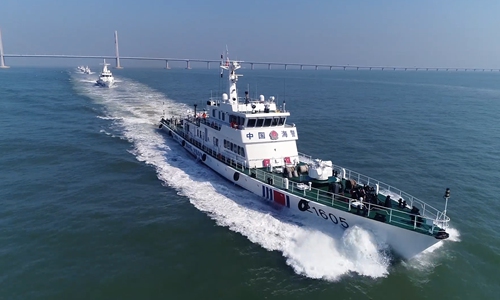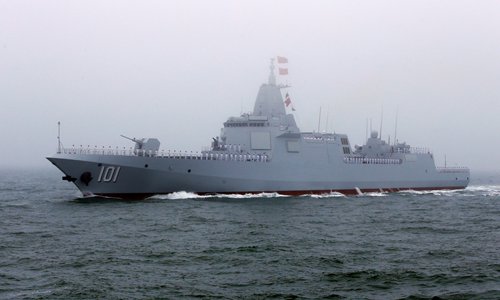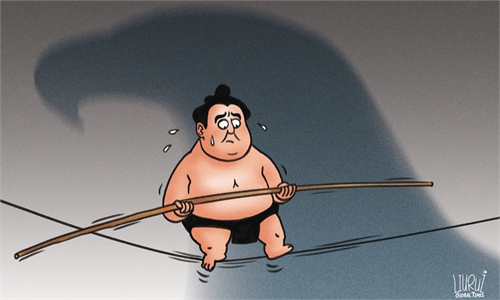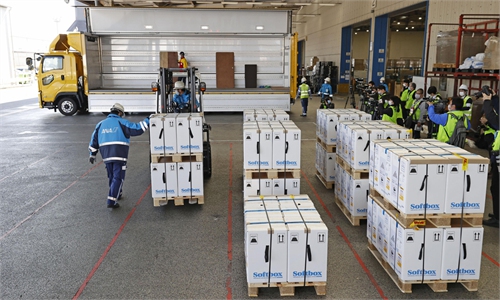China’s coast guard continues patrolling waters surrounding Diaoyu, defying US reaffirming security commitment to Japan

China Coast Guard conducts frequent patrolling, management and control missions in the West Pacific. Photo: screenshot from the Wechat account of China Coast Guard
The CCG said that its law-enforcement ships patrolled the territorial waters of China's Diaoyu Islands on Sunday, the first time that the CCG announced such action since US President Joe Biden and Japanese Prime Minister Yoshihide Suga released a joint leaders' statement on April 16 after their meeting in Washington.
The CCG patrols are a routine activity that has been conducted for many years, with the Chinese media not having specifically reported on such routine patrol for a very long time due to recovering China-Japan ties over years until recently. Such a trend has been disrupted recently by Japan's latest decision to stand with the US to contain China.
According to CCG's Sina Weibo account, the patrol mission has been conducted every month, sometimes even twice a month, in recent years.
In the US-Japan statement, the US "reaffirmed that Article V of the Treaty applies to the Senkaku Islands (China's Diaoyu Islands). Together, we oppose any unilateral action that seeks to undermine Japan's administration of the Senkaku Islands."
The CCG's patrol in the territorial waters of the Diaoyu Islands is an indication of China's sovereignty over the islands, which will not be shaken by the US-Japan joint statement, Song Zhongping, a Chinese military affairs expert and TV commentator, told the Global Times on Sunday.
China started to enforce its Coast Guard Law on February 1, with the law authorizing the CCG to use force during the law-enforcement process when they patrol in China's territorial waters, and this very reasonable law, which is similar to the laws of many other countries worldwide, has caused "concern" from Japan who has maritime disputes with China.
Wei Dongxu, a Beijing-based military expert, agreed with Song and stressed that, by possessing large patrol ships, the CCG has enough strength to defend the Diaoyu Islands from any external force that tries to interfere with it.
As recently as 5 to 10 years ago, vessels from the Japan Coast Guard had frequently interrupted the normal activities of Chinese fishermen in the region, and Japan Coast Guard vessels resorted to arms against unarmed Chinese fishermen, even illegally detained Chinese nationals, experts said.
But in recent years, when China's naval force and law enforcement capabilities have greatly strengthened, such incidents haven't happened again, so the legislation to authorize China's coast guard to use force during law enforcement and continue routine patrol missions are effective and indispensable, experts noted.

Chinese Navy Type 055 destroyer Nanchang (101) joins the naval parade to celebrate the 70th anniversary of the Chinese People's Liberation Army Navy in Qingdao, East China's Shandong Province. Photo: VCG
Military backup
If the US and Japan intend to escalate their provocations against China's core interests and sovereignty in the west Pacific region, not only the CCG, but also the People's Liberation Army (PLA) Navy and Air Force would take action, like patrolling the area, to show China's determination in safeguarding its territory, experts noted, and neither the US nor Japan has the capability to challenge China's increasing advantage.
No matter what stance the US and Japan declare on issues related to the Diaoyu Islands or the Taiwan question, the PLA will firmly safeguard China's sovereignty and territorial integrity, Song noted.
The CCG's latest patrol of the Diaoyu Islands came one day after China commissioned three main battle warships into the PLA Navy, which analysts say represents the rapid development of the PLA Navy and the Chinese shipbuilding industry amid the grave military struggle and pressure China is facing.
The US and Japan may conduct joint military drills in the waters of the Diaoyu Islands soon, which would represent a severe infringement of China's territorial sovereignty. If the US and Japan dare try to land on the Diaoyu Islands, the PLA would definitely take action to shatter such an attempt, according to Song.
Over the Diaoyu Islands issue, China always upholds the principle of putting aside disputes. But if the US and Japan keep trying to escalate the situation in the waters, the islands could be a site where the three sides engage in a military clash, even a war, experts said.




